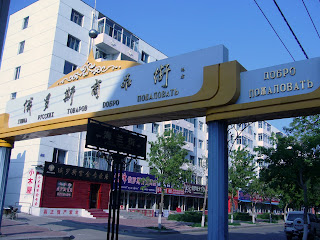Our first adventure occurred on the way to the airport. While, if they can find nothing else, most taxi drivers in most major cities can get to the airport on autopilot. Ours could not. He was so carried away chatting with Ben that he missed the freeway exit to the airport and added nearly 20 minutes to our trip. Fortunately we'd allowed plenty of time and checked-in ok, despite the long line and the fact that for mysterious reasons the self-check kiosk didn't work for us.
We discovered quickly that China has not yet grasped the concept of checking luggage through to the final destination (we were forewarned that they permit absolutely no liquids in carry-on otherwise we wouldn't have been checking luggage in the first place). As a result we had to rush to collect our luggage in Harbin and go check in a second time. Fortunately they do manage to get luggage off planes significantly more efficiently than in the US so we accomplished the task with time to spare.
We arrived in Hehei in the heat of the day (and it was HOT!). After checking in to a perfectly respectable hotel we set off to check out the town, an interesting mix of Russian and Chinese. In Beijing we've grown accustomed to signs (and when we're lucky menus) in Chinese and English. In Hehei they are in Chinese and Russian.
Although the hotel was basically fine, the smell emanating from the bathroom (not an uncommon occurrence in China) immediately convinced me that I did not want to ingest any tap water, even the small quantity necessary for brushing teeth. Fortunately bottled water was available in the restaurant downstairs. In the first of many such episodes, the sales lady mistook us for Russians. When she told me the price she did so in Russian. I couldn't make heads or tails of what she was saying, but finally concluded she'd said 60 in heavily accented English. I thought that was steep for three bottles of water, but figured we'd get a few bottles and find it cheaper elsewhere (it's usually more like RMB3-5). I extracted a RMB100 note (not having RMB60 in smaller bills) and she looked appalled and unhappy. She reached for my wallet where she extracted RMB6 - a much more reasonable sum (just under $1 for three 600ml bottles). It finally dawned on me she'd assumed I was Russian and given me the price in Russian.
We spent the rest of the day listening to prices quoted in Russian, being shown menus open to the Russian page, and otherwise treated as Russian. Interestingly, when bargaining for items in a store (always bargain in China!) when we said we weren't Russian, we were American the asking price routinely dropped.
Heihe is a small city of about 100,000 so it was pretty quick to tour downtown which mostly consisted of little shops selling Russian (or pseudo-Russian) knick-knacks. Luke bought a bottle of AK-47 vodka (clearly for the name!).
Heihe sits on the shore of the Black Dragon River which forms the border with Russia. Luke, Linda and Zoe with the river behind them:
We spent an hour or so aboard a little tour boat listening to speakers blaring indistinct noise (we think advertising).
Unlike my experience a few years ago looking from a small German village at its counterpart across the river in Poland, the Russian and Chinese sides of the river looked pretty much alike – mostly non-descript, blocky buildings, factories with scary-looking smokestacks and the occasional modern building clearly modeled after classic Russian architecture (colorful domes, etc.). Can you guess which is which?
We learned from chatting with the other passengers on the boat (who, surprisingly were mostly local) that nearly 80% of the population of the Russian town across the river was composed of Chinese. They cross over to work in Russia where they can earn far more money than they can in China.
(Answer: Russia's on the top, China's on the bottom :) ).









No comments:
Post a Comment